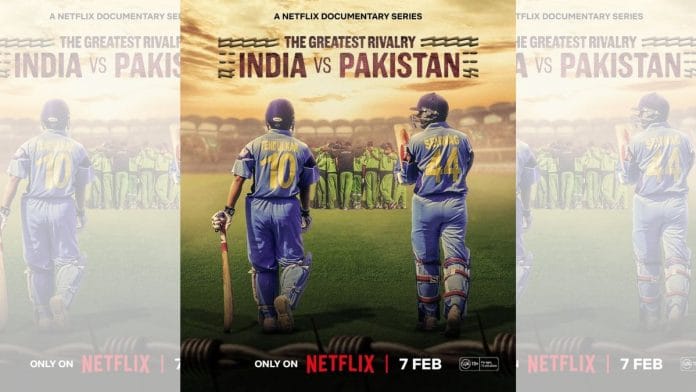New Delhi: Weeks ahead of the much-anticipated ICC Champions Trophy clash between India and Pakistan on 23 February, Netflix has planned to release a docuseries on the greatest rivalry in the subcontinent. While cricket fans on both sides of the border cannot contain their excitement, some Pakistanis are sceptical, and think it might be ‘biased’.
“I’m seriously hoping they tell the full story, not just 8-0 but more so the roots of this rivalry and I’m hoping to see the likes of Miandad, Akram, Shoaib, Sachin, and Dravid in this documentary,” a Reddit user wrote.
Titled ‘The Greatest Rivalry: India vs Pakistan’, the series is set to release on 7 February and takes viewers deep into the heart of one of the most intense and passionate rivalries in the history of cricket.
According to director Chandradev Bhagat, the docu-series “is an attempt to peal the various layers to this relationship and what makes it tick”.
“I have explored it through its politics, its culture and of course it’s cricket. The series is not just for the cricket fans but for anyone who is interested in a wholesome cross-border human story from the not so distant past.”
The teaser for the documentary, released last year in February, features cricketing icons such as Kapil Dev and Imran Khan—both holding their World Cup trophies—alongside thrilling footage of unforgettable moments from matches between India and Pakistan.
The poster features two of India’s cricket legends, Sachin Tendulkar and Virender Sehwag, walking toward a field where the Pakistani team is seen huddling together.
The documentary promises to showcase the rivalry’s intense moments and the personal stories of the sport’s greatest stars. Former cricketers like Sachin Tendulkar, Sourav Ganguly, Sunil Gavaskar, Shoaib Akhtar, and Wasim Akram are expected to offer their perspectives on this cricketing rivalry’s history, significance, and ongoing nature.
Former Pakistan fast bowler Shoaib Akhtar also shared the poster on Instagram, and fans were ecstatic.
“The Bollywood of sports, streaming soon,” Sharmila Azad wrote on Instagram.
Some fans made sure to mention how the two countries don’t play each other enough.
“Is there even a doubt about that? It’s the biggest rivalry. NO ASHES, NO BGT comes close to INDO-PAK games. It’s been more than 17 years since these two team played Test series. This is absolutely poor and shameful. Hope to see them play again at regular intervals,” a person, Hussain Khan Yousafzai, wrote on X.
Also read: TTP abducts atomic plant workers. Pakistanis call it ISI ploy to attract US action
Battle of the best
Even before its release, the documentary has sparked heated debates, with fans from both sides expressing varied opinions. In India, the excitement is palpable. Many believe the docuseries will be a superhit, celebrating India’s dominance in recent years.
However, the sentiment across the border in Pakistan is more cautious, with some fearing that the series will be ‘one-sided’ or ‘biased’.
“It’s Netflix India, so it won’t be unbiased,” one Reddit user said. “This is just another way of making money off the neighbors they claim to hate so much.”
When an Indian redditor called the series “too one-sided, not interesting. They would need another ten years of victories to catch up to us”, a Pakistani was quick to remind that “India couldn’t win a single Test in Pakistan for 50 years—from 1954 to 2004. They won’t tell you that in this documentary.”
As one Reddit user summed it up, “Pakistan was the better team of the two in the past. India is the better team of the two in the present. Regardless of World Cup results, I think everyone agrees to this assessment—both Pakistanis and Indians alike.”
Chandresh Narayanan, the head of research for the docu-series, told ThePrint that the series took more than two years to finish, and covers the history of India-Pakistan cricket along with a bit about its recent past.
Responding to the allegations of it being biased, he refuted them, adding that, “This is a well-rounded and properly balanced show which has something for all its viewers.”
(Edited by Aamaan Alam Khan)






